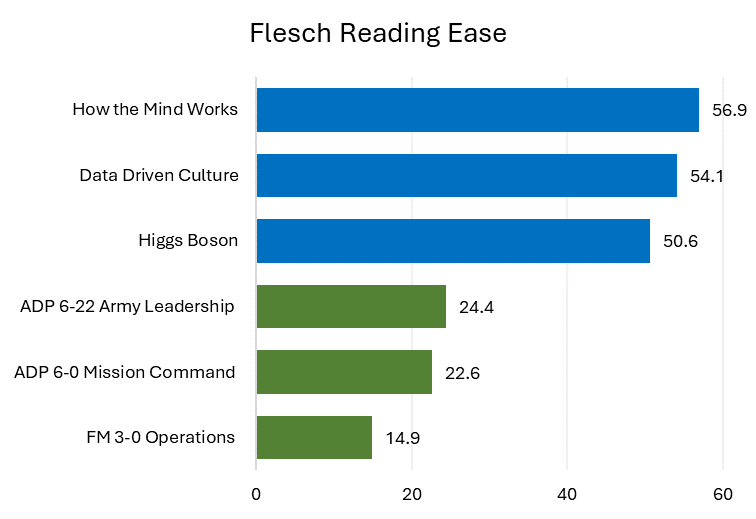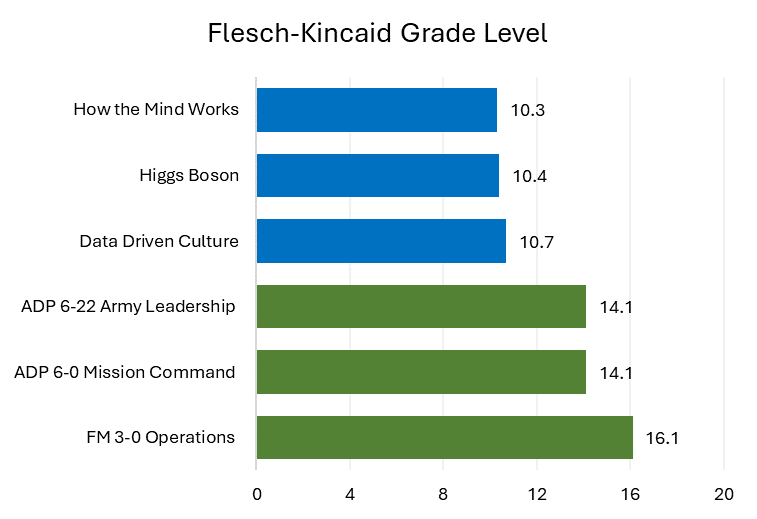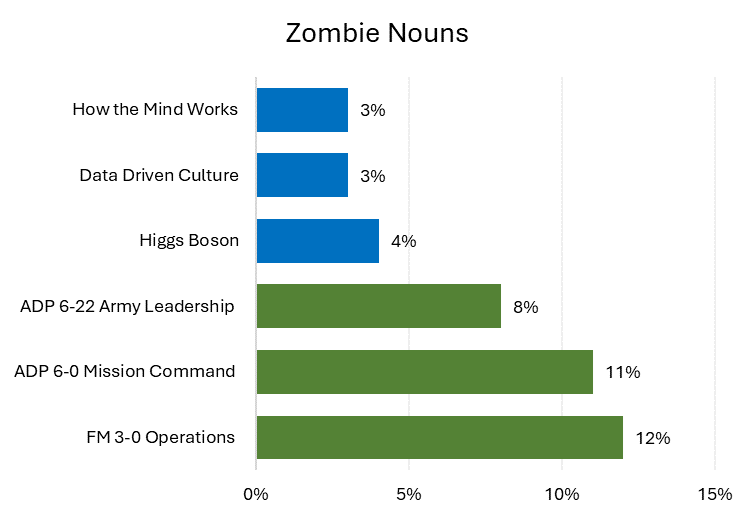The undead lurk among us—zombie nouns. These word cannibals have invaded Army writing, where they consume lively prose, leaving it dense and dead. When we, the living, find ourselves slogging through esoteric emails or impenetrable information papers, zombie nouns are close by.
Zombie nouns—nominalizations, formally—are nouns created from other parts of speech, such as adjectives (quick becomes quickness) and other nouns (favorite becomes favoritism). But the most insidious zombie nouns feed on verbs, turning them into undead, abstract nouns. Plan becomes planning. Prepare becomes preparation. Execute becomes execution.
Professor Helen Sword coined the term zombie noun to stress that nominalization words rob them of liveliness. For example, we can rehearse a briefing because rehearse is a lively verb. But we cannot rehearsal a briefing. Reanimating zombie nouns requires us to add a verb. We must conduct a rehearsal of a briefing.
Although zombie nouns are perfectly correct—and occasionally necessary—overusing them produces dense, wordy writing. We could plan, prepare, and execute a task. But when we nominalize these verbs, we must conduct planning for, perform preparations for, and implement the execution of it.
To be sure, many factors contribute to tedious Army writing. However, zombie nouns stand out as especially irksome yet easily fixable. To improve Army writing, let’s slay zombie nouns.
Readable Writing
I started this study not to find zombies but to understand what’s wrong with Army writing—the professional writing soldiers produce in everything from emails to memorandums to doctrine to published articles. Army standards demand clear, concise writing that conforms to federal plain language guidelines. Yet, much Army writing does not meet these standards. The problem is not new. Army writers have struggled for decades to write plainly and clearly. The struggle continues. One author recently criticized the Army’s operations doctrine—a prominent example of Army writing—as needlessly dense. Indeed, Army doctrine is more challenging to read than War and Peace, according to one study. But it’s not just doctrine. Dense Army human resources documents, for example, require readers to have two years of college to readily understand them (good luck, Private Snuffy).
To better understand why Army writing is often difficult to read, I compared it to effective civilian writing. I chose one book and two articles from civilian authors and publications known for clear writing on complex topics: How the Mind Works, Steven Pinker’s study of psychology in everyday life, “How the Higgs Boson was Found,” Brian Greene’s Smithsonian Magazine piece on recent advances in quantum physics, and “What Does It Actually Take to Build a Data-Driven Culture?”, a Harvard Business Review article from Mai AlOwaish and Thomas Redman.
I chose three Army doctrine manuals to represent Army writing: Field Manual (FM) 3-0, Operations, Army Doctrine Publication (ADP) 6-0, Mission Command: Command and Control of Army Forces, and ADP 6-22, Army Leadership and the Profession. Importantly, I’m interested in understanding the problems with all Army writing, not just doctrine. But doctrine is a visible and influential example of Army writing. As the Army’s professional language clearinghouse, it reflects and perpetuates the Army’s de facto writing style.
I analyzed ten-paragraph samples from each text using the Flesch Reading Ease and Flesch-Kincaid Grade Level tests. Army writers can access both using Microsoft Word’s Editor tool. The Flesch Reading Ease formula scores a text from 1 (hard to read) to 100 (easy to read). The Flesch-Kincaid Grade Level describes the education level needed to understand a text. Notably, the grade level does not measure the intellectual content of the texts, only how much education a reader needs to understand them.
Results
The results (Figures 1 and 2) show that Army doctrine is harder to read than the civilian texts. The most challenging civilian text, Greene’s quantum physics article, is significantly easier to read than the most manageable doctrine text, ADP 6-22. The civilian articles, despite their complex topics, require only a high school education to understand them. In contrast, the doctrine requires readers to have two to four years of college.
Before discussing why the civilian texts are more readable than the doctrine, it’s reasonable to ask if I’ve made a fair comparison. The civilian texts are not military doctrine or technical writing. How can I justify these choices?
It’s a fair test because the civilian authors have the same challenge as Army writers: communicating complex ideas to a general audience. While it’s true that the Army writes doctrine for practitioners, many of its practitioners are more like a general audience than seasoned professionals. According to DoD data, junior enlisted (E1–E4), noncommissioned officers (E5), warrant officers (W1–W2), or officers (O1–O3) comprise 68.9 percent of all soldiers. If Army writing is comprehensible only for people with ten years of service and a master’s degree, we’re leaving much of the Army behind.
When Brian Greene explains particle physics at a tenth-grade reading level, some see an apples-to-oranges comparison. But I see an example of the simple, clear writing Army standards demand.
Superfluous Sesquipedalian Syntax (Needless Big Words)
The main reason Army doctrine struggles? Big words. The Flesch and Flesch-Kincaid tests are based on a simple premise: short sentences and simple words are easy to read. Although sentences are slightly shorter in the doctrine compared to the civilian texts (18.1 words versus 19.7, on average), the words are significantly longer (5.9 characters versus 4.8).
Big words make writing hard to read. Consider, for example, this 1942 government blackout order:
Such preparations shall be made as will completely obscure all Federal buildings and non-Federal buildings occupied by the Federal government during an air raid for any period of time from visibility by reason of internal or external illumination.
This thirty-eight-word sentence averages 5.5 characters per word. It scores a dismal 7.3 on reading ease and 21.7 on grade level. After reading the order, President Franklin Roosevelt said, “Tell them that in buildings where they have to keep the work going, to put something across the windows.” The revised version cuts the word count by half (thirty-eight to nineteen) and the characters per word to 4.4. The changes improve reading ease to a breezy 77.6 and lower the grade level to 7.2.
We might argue Army writers need big words because they write about complex ideas. But the civilian texts, which discuss difficult topics in readable language, undermine this idea. More likely, at least some of the big words in Army writing are unnecessary—namely, zombie nouns.
Zombies!
Zombie nouns feature prominently in a wordy, abstract writing style many professionals use to sound . . . well, professional. Academese. Bureaucratese. Legalese. Officialese. All of these are variations on a style featuring insider jargon, passive voice, and zombie nouns. The blackout order above—an excellent example of bureaucratese—has four zombie nouns: preparations, government, visibility, and illumination. Roosevelt’s brisk rewrite axes all of them.
I analyzed the samples’ zombie noun content using Professor Helen Sword’s Microsoft Word add-in, The Writer’s Diet. The results (Figure 3) confirm that zombie nouns have overrun the Army samples. Zombie nouns comprise 8–12 percent of the Army texts compared to 3–4 percent of the civilian texts (To be fair since operations is a zombie noun, a manual called FM 3-0, Operations discussing multidomain operations was never going to do well).
If zombie nouns are so bad, why do Army writers use them? First, zombie nouns tend to be big words, and many writers (not just Army types) mistakenly believe big words make them sound smart. In a recent survey, 58 percent of people admitted they tried to sound more intelligent by using a word they didn’t understand, and 78 percent said using big words makes someone seem smarter.
But they’re wrong—at least in writing, where research finds the opposite effect. When asked, people may say that big words indicate higher intelligence. But when people read complex texts, they judge the writer as less intelligent than writers who use simple words.
The second reason Army writers use zombie nouns is culture. They are part of the Army’s de facto writing style. For example:
The current methodology of the employment of the Fire Support Coordination Line (FSCL) is routinely seen as the separation of components and a risk reduction mechanism for the employment of fires that effectively inhibits the dynamic and full execution of fire support in [response] to a rapidly moving non-contiguous force that is enemy centric in its defeat mechanism.
It’s easy to criticize this zombie-infested passage. But the author, an Army officer, writes no differently than other Army professionals—in the de facto Army style. And he’s not the only one. From the Army’s strategic documents to its lessons learned, we find difficult writing teeming with zombie nouns.
The Cure: Simplicity
Happily, verb-eating zombie nouns are far easier to kill than their cinematic namesakes. Just use verbs. Instead of implementing a restructuring of combat formations, just restructure them. Don’t improve the retention of soldiers; simply retain them. Rather than making use of all combat power, just use it.
Satisfying as it may be, dispatching verb-killing zombies won’t solve all the Army’s writing woes. But it’s a good start, and it moves the Army’s de facto writing style closer to published guidelines. Army standards tell writers to use short words and avoid jargon. Killing zombie nouns helps them do both.
Reducing zombie nouns can also shift Army culture toward valuing simple, clear language. Needless zombie nouns are a symptom; infatuation with complex language is the disease. Doctrine is a visible example, but this isn’t a doctrine problem. Anyone who’s read Army writing—evaluation reports, award citations, situation reports, even emails—knows this is an Army problem. I know it because I’ve done it:
PowerPoint briefings often circulate within organizations as standalone communications, which can lead to misinterpretation of ideas.
Three zombie nouns (organizations, communications, and misinterpretation) in one sentence courtesy of yours truly.
Doctrine is a good place to start changing Army writing culture into one that values simple, direct prose. And the change is quietly underway. Over the last few years, the Combined Arms Doctrine Directorate at Fort Leavenworth has made doctrine simpler and easier to read. For example, the 2022 edition of FM 3-0, Operations has seven fewer words per sentence than the 2017 version. This change is a great start, but more work is needed.
Doctrine is moving in the right direction. The rest of the Army must follow. Effective writing is easy to read and understand, and Army writing is no different. From professional journals to evaluation reports to routine emails, writers across the Army should produce and demand simple, concise, and clear writing.
P.S. The article you’ve just read averages 5.1 characters per word. It scores 48.2 for reading ease and 10.0 for grade level. Zombie nouns make up 3 percent of the text.
Trent J. Lythgoe, PhD, is an associate professor of military leadership and the Fox Conner Chair of Leadership Studies at the US Army Command and General Staff College. Dr. Lythgoe is the project editor of Professional Writing: The Command and General Staff College Writing Guide.
The views expressed are author(s) and do not reflect the official position of the United States Military Academy, US Army Command and General Staff College, Department of the Army, or Department of Defense.





